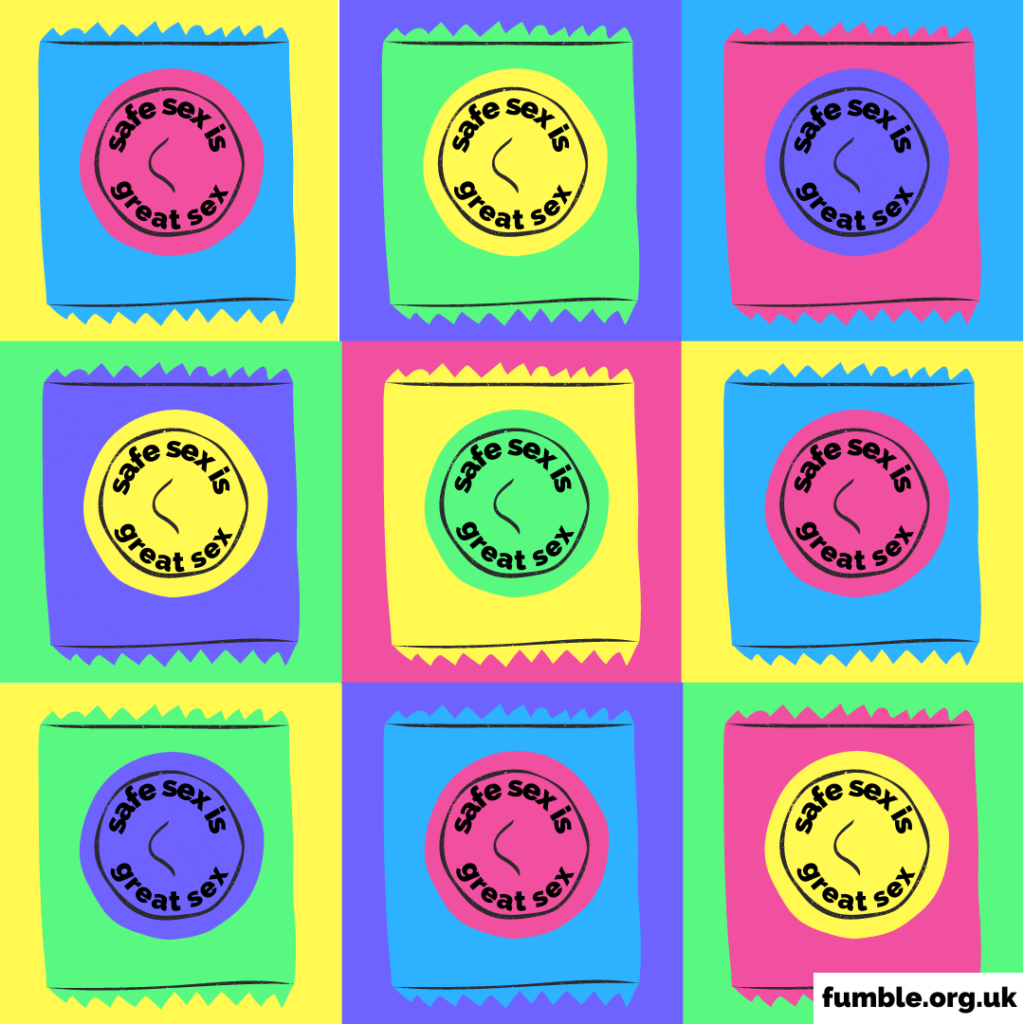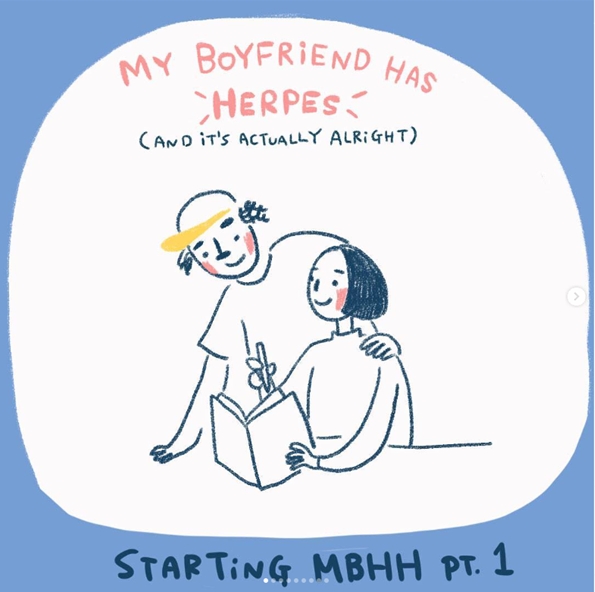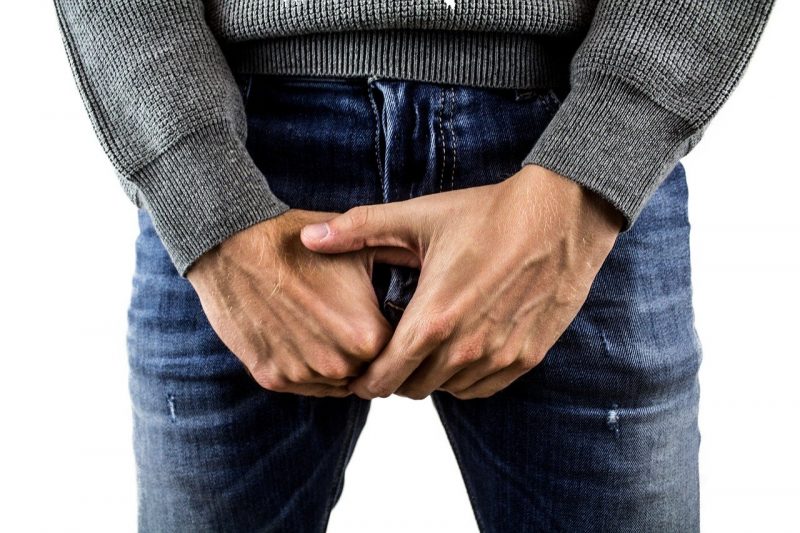Genital herpes is an STI caused by the virus HSV, but what is that and how do we keep ourselves safe?
Genital herpes is a viral sexually transmitted infection (STI) that can infect the genital/anal area with blisters or sores.
How do people get genital herpes?
Genital herpes are caused by Herpes Simplex (HSV). There are two types: HSV1 and HSV2. Both of these types can infect the genital/anal area, as well as the mouth and nose area, which is known as cold sores.
Herpes is passed on during sexual contact, usually before, during or straight after an outbreak. An outbreak means when someone has blisters and sores. The virus is very contagious and infects the body by entering small cracks in the skin or through the soft lining of the mouth, vagina, rectum, urethra and under the foreskin.
Sexual contact doesn’t only mean penetrative sex, this also includes any unprotected sexual activity.
- Anal sex
- Vaginal sex
- Oral sex
- Your genitals touching someone else’s genitals
- Sharing sex toys without using different condoms or washing them properly in between uses
- If you receive oral sex from someone with a cold sore
- If someone with whitlows (herpes on the hand) touches your genitals or anal area
Unprotected sexual activity means without barrier methods of contraception, e.g. condoms or dental dams. Herpes cannot be passed on by hugging, sharing baths, towels, cups or plates, via toilet seats or in swimming pools.

What are the signs and symptoms of genital herpes?
Many people with HSV don’t have visible signs or symptoms and they can still be pass the virus on (asymptomatic shedding). However, the virus is most likely to pass on when someone has visible blisters or sores. If you do show symptoms, they include:
- Stinging, tingling or itching in the genital/anal area
- Small fluid-filled blisters on the genital/anal area, the buttocks and the tops of the thighs (these can burst and cause painful red sores)
- Pain when urinating (when urine passes over the sores)
- Vaginal/urethral discharge
- Flu-like symptoms (fever, headache, aches)
The first outbreak someone experiences may last up to 2-4 weeks with the sores usually healing within 5-10 days. The sores will eventually heal without scarring.
How can I check if I do have genital herpes?
If you think you have herpes, or if a partner has them, visit a sexual health clinic, a GUM clinic, a Brook service or your GP surgery. Find your nearest service here. There’s no test for herpes, apart from an examination when symptoms start to develop. The doctor or nurse may be able to diagnose herpes by examining the affected area, but they will also confirm this by brushing a swab over the blisters in the affected area and sending it to the lab. Results are usually back within 1-2 weeks.
What happens if I do have genital herpes?
There’s no cure for herpes, but there is treatment. This involves antiviral tablets daily for 5 days, within 5 days of the start of the first outbreak. The antiviral tablets can’t clear the virus from your body, but they prevent the virus from multiplying. Antibiotics don’t work because genital herpes is a virus, rather than a bacterial infection.
If left untreated, herpes will eventually clear by itself, however treatment can significantly help with outbreaks and healing. Treatment also reduces the risk of passing it onto someone else.
Because there’s no cure, you may get outbreaks again in the future. However, your body has already produced antibodies to fight the viral infection, so these later outbreaks are usually less severe and they heal faster. For some people, certain things can trigger an outbreak:
- Being sick or run down
- Stress
- Friction from sexual activity, including masturbation
- Tight, non-cotton underwear
- Particular times in your menstrual cycle
- Drinking/smoking too much
Sometimes, people may find that they need another course of antivirals. If people have frequent outbreaks (more than six a year), they may need suppressive treatment which involves taking antiviral medication for a longer period of time.
If you do have genital herpes, it’s important that you don’t have any sexual contact before or during an outbreak. Wait for a week after your symptoms have fully gone, to ensure you won’t pass the infection onto anyone else.
Previous sexual partners (from the last 6 months) also need to know. This can feel nerve-wracking, but they may have the infection as well and need treatment. If it feels too difficult to talk to previous sexual partners, some clinics offer a ‘partner notification’ service that warns them of potential exposure to a STI without mentioning any names.
How do I keep myself safe from genital herpes?
Barrier methods of contraception, like condoms and dental damns, can help to protect from genital herpes. However, condoms don’t cover all the skin area, so they can’t completely protect you. Dental dams are another barrier method for flat skin surfaces, like the vulva or anus. If your partner has blisters or sores, avoid any sexual activity until they’ve been checked out.
If you do develop genital herpes, it is not the end of the world! People with non-curable STIs still have healthy and fulfilled sexual relationships. This Instagram account does a great job at showing this:

The treatment will help a lot, but there are also some other things you can do to help the healing process during an outbreak:
- Put an ice pack/ice cubes in a plastic bag on the affected area (don’t apply the ice directly to the skin)
- Take a cool shower (without using soap or shower gel)
- Use an over-the-counter anaesthetic cream (e.g. lidocaine)
- Use over-the-counter painkillers to help with the pain
- Gently bathe the affected area with warm salt water (1 teaspoon of salt for 1 pint of water)
- If urinating is painful, urinate in a warm bath or shower
- Wash your hands before and after touching the affected area
- Drink lots of water and keep hydrated
- Wear loose, cotton clothing
- Don’t wash with soaps too often
- Don’t touch the blisters/sores unless you’re applying cream
There’s a lot of stigma surrounding STIs, but they’re very common. There’s nothing dirty or wrong about having a STI, they’re part of being sexually active, but we do need to test regularly and look after our health. It’s also important to know about our genital area; it’s easier to notice any changes if we know what it looks like normally. Just like we’re hyper aware of our faces and if any spots or bumps appear, it’s healthy to be aware of our genital area too.
Other support
- Blog: The Herpes Diaries #1
- Where to get a sexual health check in the UK
- What to do if you have an STI
- How to talk about our STI status before sex
- NHS – Genital herpes
Read more
Last Reviewed 8 December 2022
Image Credit: Fumble



